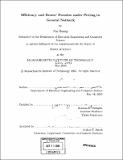Efficiency and braess' paradox under pricing in general network
Author(s)
Huang, Xin, 1978-
DownloadFull printable version (3.113Mb)
Other Contributors
Massachusetts Institute of Technology. Dept. of Electrical Engineering and Computer Science.
Advisor
Asuman E. Ozdaglar.
Terms of use
Metadata
Show full item recordAbstract
Today's large scale networks such as the Internet emerge from the interconnection of privately owned networks and serve heterogeneous users with different service needs. The service providers of these networks are interested in maximizing their profit. Since the existing pricing scheme cannot satisfy their needs, the service providers are looking for new pricing mechanisms. However, designing a for-profit pricing scheme is not a trivial task. The network contains millions of users who have their own interests and they react differently to price. Given such variety, how should the service providers charge the network resources to maximize their profit? In the presence of profit maximizing price, how should we allocate resources among these heterogeneous users? Will the resulting system suffer from efficiency loss? In this thesis, we will study these fundamental questions of profit maximizing price. We make three main contributions: First, we develop a framework to study profit maximizing prices in a general congested network. We study the flow control and routing decisions of self-interested users in the present of profit maximizing price. We define an equilibrium of the user choices and the monopoly equilibrium (ME) as the equilibrium prices set by the service provider and the corresponding user equilibrium. (cont.) Second, we use the framework to analyze the networks containing different types of user utilities: elastic or inelastic. For a network containing inelastic user utilities, we show that the flow allocations at the ME and the social optimum are the same. For a network containing elastic user utilities, we explicitly characterize the ME and study its performance relative to the user equilibrium at 0 prices and the social optimum that would result from centrally maximizing the aggregate system utility. Third, we define Braess' Paradox for a network involving pricing and show that Braess' Paradox does not occur under monopoly prices.
Description
Thesis (S.M.)--Massachusetts Institute of Technology, Dept. of Electrical Engineering and Computer Science, 2005. Includes bibliographical references (p. 79-82).
Date issued
2005Department
Massachusetts Institute of Technology. Department of Electrical Engineering and Computer SciencePublisher
Massachusetts Institute of Technology
Keywords
Electrical Engineering and Computer Science.